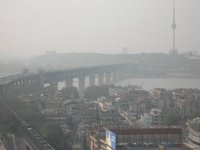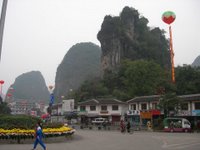Hong Kong to Hanoi
A new phase of the trip has started--I have not only left China for Vietnam, but am also traveling now alone. Chris has decided to return to the U.S. and flew out of Hong Kong last week.
I, meanwhile, was quite busy in Hong Kong. I met with and interviewed a number of Hong Kong legislators, party officials, and activists about political reform in the special administrative region. I also had the opportunity to attend a number of events at the Foreign Correspondents Club where I heard, among other people, the Israeli Vice Prime Minister. And of course the WTO Ministerial Conference was on at this time.
A few days ago I made my way to Guangzhou. From there I traveled to the Vietnamese border via Nanning where I crossed into Vietnam. A short bus trip took me to Hanoi, where I'm currently staying.
Traveling in a motorized vehicle in China was always an experience, but the trip from Pingxiang (end of the train line) to the border crossing was the craziest yet. I took a motorized rickshaw-type vehicle (a motorcycle with a flatbed attached to the rear). On the outskirts of Pingxiang we came to a large highway. My driver, for reasons which remain unknown to me, believed it a good idea to drive in the overtaking lane on the wrong side of the four-lane divided highway. Luckily there wasn't much (although there was certainly some) oncoming traffic.
Crossing the border was, itself, quite painless. I was happy to find that driving habits differ little on the Vietnamese side. In both China and Vietnam two-lane roads quickly become four-lane as vehicles overtake one another in both directions, regardless of oncoming traffic. Taking a taxi from the border to the bus station on the Vietnamese side, though, we were overtaken by a minibus which itself was being overtaken by a second minibus. Approaching us, at the same time, were two cars, one overtaking the other. All on what was ostensibly a two-lane road.




 From Yichang, we took a cruise upstream, through the Three Gorges, to Chongqing, onetime seat of the Kuomintang government during the Second World War. The cruise took three days and nights, arriving early on the fourth day. The boat had mostly Chinese tourists, although there was a small Australian tour group and a Dutch couple whose company we enjoyed. At night, in our small four-berth cabin, we listened to rats scuttle around the room.
From Yichang, we took a cruise upstream, through the Three Gorges, to Chongqing, onetime seat of the Kuomintang government during the Second World War. The cruise took three days and nights, arriving early on the fourth day. The boat had mostly Chinese tourists, although there was a small Australian tour group and a Dutch couple whose company we enjoyed. At night, in our small four-berth cabin, we listened to rats scuttle around the room. 












